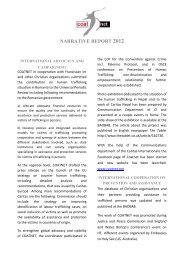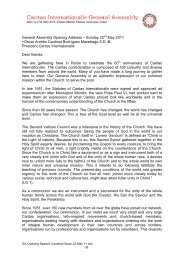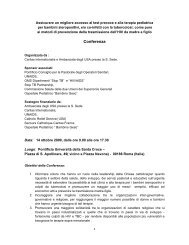"Caritas: the practice of Love by the Church as a "Community of Love"
"Caritas: the practice of Love by the Church as a "Community of Love"
"Caritas: the practice of Love by the Church as a "Community of Love"
You also want an ePaper? Increase the reach of your titles
YUMPU automatically turns print PDFs into web optimized ePapers that Google loves.
Thus, “For <strong>the</strong> <strong>Church</strong>, charity is not a kind <strong>of</strong> welfare activity which could equally well be<br />
left to o<strong>the</strong>rs, but is a part <strong>of</strong> her nature, an indispensable expression <strong>of</strong> her very being” (cf. Deus<br />
<strong>Carit<strong>as</strong></strong> est no. 25). Therefore, through her service <strong>the</strong> <strong>Church</strong> manifests <strong>the</strong> charity <strong>of</strong> Christ.<br />
This implies that <strong>the</strong> <strong>Church</strong> is <strong>the</strong> subject directly responsible for <strong>the</strong> service <strong>of</strong> charity and<br />
that her charitable organisations constitute an opus proprium, a t<strong>as</strong>k in accordance with her nature,<br />
and participate in her mission (cf. Deus <strong>Carit<strong>as</strong></strong> est, no. 29). Participation means in some way being<br />
an instrument, but never <strong>the</strong> origin or end <strong>of</strong> what one serves. Moreover, I believe it is important to<br />
understand that our charitable organisations are located within <strong>the</strong> <strong>Church</strong> and not alongside her. A<br />
<strong>Carit<strong>as</strong></strong> that w<strong>as</strong>n’t an ecclesial expression would have no meaning or existence. The <strong>Church</strong> cannot<br />
be considered <strong>as</strong> a partner <strong>of</strong> Catholic organisations. They are <strong>the</strong> organisations that take part in her<br />
mission. This gives us a responsibility, a vocation and a special commitment: to be at <strong>the</strong> heart <strong>of</strong><br />
<strong>the</strong> <strong>Church</strong> <strong>as</strong> <strong>the</strong> most beautiful and most real manifestation and expression <strong>of</strong> her essence, namely<br />
<strong>of</strong> <strong>the</strong> charity <strong>of</strong> God.<br />
Besides, <strong>as</strong> <strong>the</strong> <strong>Church</strong> h<strong>as</strong> an episcopal structure, charitable organisations report to bishops<br />
who, <strong>as</strong> <strong>the</strong> successors <strong>of</strong> <strong>the</strong> Apostles, bear a prime responsibility in <strong>the</strong> life <strong>of</strong> <strong>the</strong> <strong>Church</strong> and<br />
<strong>the</strong>refore <strong>the</strong> implementation <strong>of</strong> DIAKONIA. So it is necessary that charitable organisations are<br />
really able to work in full communion and deep connection with <strong>the</strong> local bishop, and in accordance<br />
with p<strong>as</strong>toral guidelines, in order to be fully integrated within <strong>the</strong> mission <strong>of</strong> <strong>the</strong> <strong>Church</strong>. Bishops<br />
also have a special duty not to abandon <strong>the</strong>ir charity organisations, but ra<strong>the</strong>r to help and promote<br />
<strong>the</strong>m, and consider <strong>the</strong>m <strong>as</strong> a central <strong>as</strong>pect <strong>of</strong> <strong>the</strong>ir p<strong>as</strong>toral responsibility towards <strong>the</strong> People <strong>of</strong><br />
God. I strongly encourage <strong>the</strong> bishops here today to never forget or neglect to pay very special<br />
attention to <strong>the</strong> works <strong>of</strong> charity <strong>of</strong> <strong>the</strong> <strong>Church</strong> and <strong>the</strong> organisations that manage <strong>the</strong>m in <strong>the</strong> name<br />
<strong>of</strong> <strong>the</strong> <strong>Church</strong> <strong>as</strong> a “<strong>Community</strong> <strong>of</strong> <strong>Love</strong>”.<br />
This service <strong>of</strong> Charity is part <strong>of</strong> <strong>the</strong> three missions that express <strong>the</strong> pr<strong>of</strong>ound nature <strong>of</strong> <strong>the</strong><br />
<strong>Church</strong>. They are called Diakonia, Leiturgia and Martyria, and cannot be separated. Often, <strong>the</strong><br />
presence <strong>of</strong> <strong>the</strong> <strong>Church</strong> through <strong>the</strong> service <strong>of</strong> charity is <strong>the</strong> only means <strong>of</strong> evangelising. But in this<br />
proclamation, what do we want to bear witness to? It isn’t a question <strong>of</strong> proselytising. “Those who<br />
practise charity in <strong>the</strong> <strong>Church</strong>’s name will never seek to impose <strong>the</strong> <strong>Church</strong>'s faith upon o<strong>the</strong>rs”<br />
(Deus <strong>Carit<strong>as</strong></strong> est, no. 31 c). Indeed, it means bearing witness to a love that comes not from us but<br />
from God. We must express <strong>the</strong> comp<strong>as</strong>sion, love and salvation <strong>of</strong> God fulfilled in Jesus Christ.<br />
Filling <strong>the</strong> world with light, being <strong>the</strong> salt and <strong>the</strong> light, is how <strong>the</strong> Lord described <strong>the</strong> mission <strong>of</strong><br />
His disciples. Taking <strong>the</strong> good news <strong>of</strong> God’s <strong>Love</strong> to <strong>the</strong> ends <strong>of</strong> <strong>the</strong> earth is what Christians<br />
should dedicate <strong>the</strong>ir lives to, in one way or ano<strong>the</strong>r. Some <strong>of</strong> you might <strong>as</strong>k how you can<br />
6












